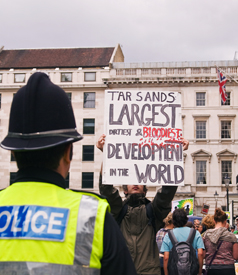Honest, paywall-free news is rare. Please support our boldly independent journalism with a donation of any size.
Washington – Sweltering heat was not enough to keep away the 60 to 70 protesters who pulled on “Oil Spill Prevention Team” t-shirts over their already-damp clothing. For the protesters who massed next to the Canadian embassy on Pennsylvania Avenue, the issue at hand was the neighbor up north and next door: Canada. More specifically, its tar sand mines, which provide bitumen-based fuel that is converted to conventional petroleum. The protesters gathered in the mostly empty plaza at noon because the Obama administration is poised to approve or veto a 1,700-mile pipeline that would ferry oil from Alberta, Canada, to the Gulf of Mexico.
Holding signs saying “No Pipeline, No Pollution” and “We don’t want your dirty oil,” the Washington protesters were part of a multi-state, multinational effort to oppose the Keystone XL Pipeline, which is under scrutiny by environmental interest groups like Friends of the Earth and the National Resources Defense Council, as well as by congress – particularly chairman of the House Committee on Energy and Commerce, Rep. Henry A Waxman (D-California).
In a July 2 letter to Secretary of State Hillary Clinton, Rep. Waxman urged Clinton not to approve the pipeline which, once complete, is expected to transport up to 90,000 barrels of oil a day.
“The problem is that oil can be extracted from the tar sands only by using three times the energy required to produce a barrel of conventional oil,” he wrote. Also of concern, Waxman noted, was that the State Department, which has approval on the project because it crosses an international border, is pushing an aggressive review schedule.
According to Waxman, multiple agencies need to weigh in to provide a rounded understanding of the pipeline’s environmental impact. The State Department, Waxman said in his letter to Clinton, is not providing an adequate window for research and would therefore be making a decision with insufficient information. “I am troubled by the process that the State Department appears to be following,” he wrote.
To Elizabeth Orlando, the Keystone XL Pipeline Project Manager, to whom Waxman wrote a separate letter on July 2, he criticized the environmental impact study the company had submitted for its lack of disclosure.
“The draft EIS contains no analysis of the potential greenhouse gas impacts of the pipeline . . . nor does it address any of the other significant environmental effects from tar sand developments that occur in Canada, such as destruction of the boreal forest ecosystem, extensive water pollution, air pollution, habitat loss, and effects on species,” he wrote.
In addition to the environmental hazards of the proposed pipeline, Waxman urged the Secretary of State to look beyond the approximately $7 billion project and to understand how the pipeline fits in with the larger US energy supply.
Waxman wrote that adding the XL pipeline to the energy mix would increase tar sand imports to over three billion barrels a day and pump more than 37% greenhouse gasses into the atmosphere because the XL pipeline would be one of three such pipelines – joining the Keystone and Alberta Clipper pipelines which are already in progress. Further, Waxman wrote, the XL pipeline “would constitute a multi-billion dollar investment to expand our reliance on the dirtiest source of transportation fuel currently available,” and would be in conflict with President Obama’s efforts to move to a clean energy economy.
For South Dakota rancher Paul Siemens, who stood before the press next to an oversized oil barrel to speak, the pipeline is of particular concern. The Draper, South Dakota, rancher came to Washington to protest not because the pipeline will most likely crisscross his property, but because he was worried about safety. TransCanada Corp, the pipeline contractor, has asked for a safety waiver to use thinner steel than regulations require in areas considered “low-consequence.” According to Siemens, all of South Dakota would be considered a low-consequence area, as would parts of Montana, North Dakota and Nebraska, a deprecation he said residents of those states would not agree with. Further, Siemens said, the XL Pipeline would be a problem because it would empty into the Missouri River, which is a major source for the state’s drinking water. “Clean water is precious to residents of South Dakota, oil pipelines are not,” he said.
Gloria Reuben, a board member of the National Wildlife Federation, who was born in Toronto and became a US citizen last year, was focused on accountability.
“Clearly, most recently we’ve seen what with the coal mine disaster in West Virginia, and obviously, two weeks later the BP spill [is that these industries are] blatantly violating a number of different regulations without any regard for how their actions are impacting lives,” she said. But Reuben did not leave all the responsibility with the energy companies: President Obama, she said, has to shoulder responsibility for what comes next. Quoting from the president’s June 16 speech in which he said, “The time to embrace a clean energy future is now,” Reuben said, “We need to hold him to those words. We need to make sure that he follows through on that vow, on that pledge.”
Media that fights fascism
Truthout is funded almost entirely by readers — that’s why we can speak truth to power and cut against the mainstream narrative. But independent journalists at Truthout face mounting political repression under Trump.
We rely on your support to survive McCarthyist censorship. Please make a tax-deductible one-time or monthly donation.
